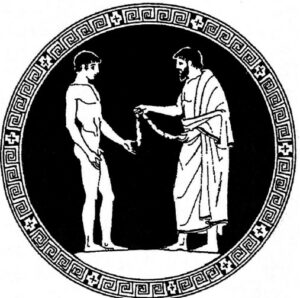Origin and Historical Evolution of Sports
As a Common European Cultural Activity
The Olympic Games in Ancient Greece

The sporting events at Olympia were the oldest and most important of the four national Greek athletic festivals. The games were held on an official basis every four years from 776 BC, but they probably originated much earlier. Greek myth credited the hero Herakles with devising the running races at Olympia to celebrate the completion of one of his twelve labors.
Olympia was the most important sanctuary of the god Zeus, and the Games were held in his Honor. Sacrifices and gifts were offered, and athletes took oaths to obey the rules before a statue of Zeus. The games were announced by heralds travelling to all the major Greek cities around the Mediterranean, and hostilities were banned during the period around the Games to safeguard those travelling to and from Olympia.
The games at Olympia continued with minor interruptions into early Christian.
times and were the inspiration for the modern Olympic Games, first staged in Athens in 1896.
Archaeology at Olympia
Over the centuries the river Alpheios, to the south of the sanctuary, folded and swept away the hippodrome, and the river Kladeios to the west destroyed part of the gymnasium. Following earthquakes and storms, a layer of silt was deposited over the entire site. Olympia lay unnoticed until modern times when an Englishman, Richard Chandler, rediscovered it in 1766.
The German government sponsored full-scale excavations from 1875. The excellent local museum displays many of the remarkable finds, and the German Archaeological Institute in liaison with the Greek Archaeological Service continues to investigate the site to the present day.
Equestrian Events
In ancient Greece only the wealthy could afford to maintain a chariot and horses. Chariots had been used to carry warriors into battle, and chariot races, along with other sports events, were originally held at the funeral games of heroes, as described in Homer’s Iliad.
Wealthy citizens and Greek statesmen were anxious to win such a prestigious event. They sometimes drove their own chariot, but usually employed a charioteer. The races took place in an arena called the hippodrome. The most dangerous place was at the turning post, where chariot wheels could lock together and there were many crashes.
After the dangers and excitement of the chariot race came the horseracing. This was hazardous because the track was already churned up, and the jockeys rode without stirrups or saddles, which were not yet invented. The winning horse and its owner was given an enthusiastic reception, and riderless horses that came first past the post were also honored.
Combat Sports
A big attraction at all the Greek games were the ‘heavy’ events – wrestling, boxing, and the pankration, a type of all-in wrestling. Specialists in the sports could win large sums of money all over the Greek world, once they had proved themselves sat Olympia.
Wrestling was a sport of great skill which used many of the throws still seen today. It also featured as part of the pentathlon. Boxing was considered the most violent sport.
There were no separate rounds in a match and the contestants fought until one of them gave in. In ancient Greece thin strips of leather were bound around the boxers’ fists to protect their hands.
Boxing gloves were eventually developed, and in the Roman period they were weighted with lead or iron to inflict greater damage.
The pankration was a mixture of boxing and wrestling, where almost any tactic was permitted. Only biting and going for an opponent’s eyes were illegal.
RUNNING EVENTS
The most ancient and prestigious even tat Olympia was the running race along the length of the stadium, a distance of 600 Olympic feet (192.28 metres). The Olympiad (the four-year period up to the next Games) was named after the winner, and dates were recorded by reference to the list of victors.
Besides this equivalent of our ‘two-hundred meter’ event, there was a race along two lengths of the track, and a long-distance race of twenty or twenty-four lengths. There was no ‘marathon’ – this was the invention of Baron de Coubertin who revived the Olympic Games in 1896. In all these races the runners made a standing start, from a row of stones labs set in the track that had grooves cut in them to provide a grip for the toes.
Pentathlon
The pentathlon was made up of five events – discus, jumping, javelin, running and wrestling – which all took place in one afternoon. Running and wrestling also existed as separate events.
There are differences between the ancient and the modern contests. Greek discus-throwers did not spin round on the spot: they rarely managed throws of more than 30 metres, less than half the modern Olympic record.
In the ancient long-jump, contestants used jumping-weights. These were swung forward on take-off then backward just before landing, to add thrust and gain extra length. Some kind of multiple jumps may have been involved. Javelin- Throwing was similar to today’s event, except that a thong was attached to the javelin shaft to add spin and secure a steadier flight.
The Programme of Events
Day One
Morning: Swearing-in ceremony. Contests for heralds and trumpeters. Boys’ running, wrestling and boxing contests. Prayers and sacrifices in the sanctuary of Zeus, consultation of oracles.
Afternoon: Speeches by philosophers, poets and historians. Tours of the sanctuary of Zeus. Reunions with old friends.
Day Two
Morning: Procession in the hippodrome of competitors in the equestrian events. Chariot and horse-races.
Afternoon: The pentathlon.
Evening: Funeral rites in honor of the hero Pelops. Parade of visitors around the sanctuary of Zeus. Singing of victory hymns. Feasting and revelry.
Day Three
Morning: Procession of the judges, ambassadors, competitors, and sacrificial animals to the Great Altar.
Afternoon: Running races.
Evening: Public banquet in the Prytaneion.
Day Four
Morning: Wrestling event.
Midday: Boxing and the pankration (all-in wrestling).
Day Five
Procession of victors to the Temple of Zeus, to be crowned by the judges with garlands of wild olive.
READ MORE…
“ORIGIN and HISTORICAL EVOLUT ION of SPORTS” $19.95
Click on the order button below for Instant Access!
 Our 100% Money Back Guarantee:
Our 100% Money Back Guarantee:
If for any reason you decided within 30 days that “ORIGIN and HISTORICAL EVOLUT ION of SPORTS” isn’t for you, simply notify us by email and we’ll gladly refund your money – no questions asked. That’s our Ironclad Guarantee!
The risk is entirely ours! You absolutely have nothing to lose!
Your name and email will Never be shared, sold, or given to anyone.
We keep our subscriber’s privacy sacred. We do not sell or rent your personal information to other parties. What’s more you can always unsubscribe at any time!
Regards, Coyalita
Copyright © 2021-2024 1-Stop-Sporting-Goods.com All Rights Reserved Privacy Policy – Earnings Disclaimer – Terms of Use – Contact Us

